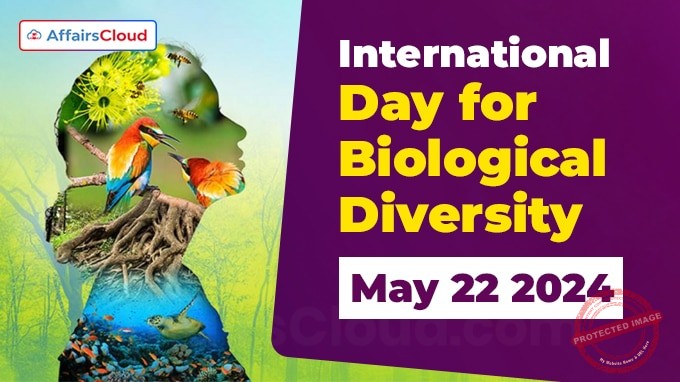 The United Nations (UN) International Day for Biological Diversity(IDB) is annually observed across the globe on 22nd May to increase understanding and awareness of biodiversity issues and to promote the conservation of biological diversity.
The United Nations (UN) International Day for Biological Diversity(IDB) is annually observed across the globe on 22nd May to increase understanding and awareness of biodiversity issues and to promote the conservation of biological diversity.
Theme:
The theme of IDB 2024 is “Be part of the Plan”.
The 2024 theme calls on all sectors of society including governments, communities, etc, to support the implementation of the Kunming-Montreal Global Biodiversity Framework (GBF), also referred to as the Biodiversity Plan.
Significance:
i.IDB aims to increase recognition of the significant challenges human activities pose to biological diversity and the role of biodiversity as a global asset to future generations.
ii.The 2024 celebration aims to build momentum for the 16th meeting of the Conference of the Parties to the Convention on Biological Diversity (COP 16), set for 21st October to 1st November 2024 in Colombia.
Background:
In 1995, the UN General Assembly (UNGA) adopted the resolution A/RES/49/119, proclaiming 29 December, as International Day for Biological Diversity.
ii.In 2001, the UNGA adopted the resolution A/RES/55/201 and proclaimed the 22nd May of every year as the International Day for Biological Diversity.
iii.The first ever International Day for Biological Diversity was observed on 22nd May 2002
Why May 22?
The date commemorates the adoption of the text of the Convention on Biological Diversity (CBD) in 1992 by the Nairobi Final Act of the Conference for the Adoption of the Agreed Text of the CBD at Nairobi, Kenya.
Note: The Convention was opened for signature on 5th June 1992 at the UN Conference on Environment and Development (UNCED) (the Rio “Earth Summit”) in Rio de Janeiro, Brazil. It remained open for signature until 4 June 1993.
About the Convention on Biological Diversity (CBD):
i.CBD, the 1st global agreement to cover all aspects of biological diversity is an international legal framework ratified by 196 nations. It aimed at:
- Conserving biological diversity.
- Ensuring the sustainable use of its components.
- Promoting the fair and equitable sharing of benefits from genetic resources.
ii.Governance: The COP is the CBD’s governing body. It meets biennially to review progress, set priorities, and establish work plans.
Kunming-Montreal Global Biodiversity Framework (GBF):
i.It is a landmark agreement adopted in December 2022 by 196 countries at the UN Biodiversity Conference (COP15) in Montreal, Canada.
ii.The GBF’s goal is to halt and reverse biodiversity loss by 2030, and to set a global vision of a world living in harmony with nature by 2050.
iii.The GBF includes 23 targets for 2030 and 4 overarching goals for 2050.
Understanding Biological Diversity:
i.Biological Diversity is often understood in terms of the variety of plants, animals, microorganisms, genetic differences within species, and diverse ecosystems.
ii.These ecosystems support intricate interactions among humans, plants, and animals.
Importance of Biodiversity:
i.Foundation of Civilizations: Biodiversity resources are essential for human survival and development.
ii.Protein Source: Fish contribute 20% of animal protein to around 3 billion people.
iii.Diet: Over 80% of the human diet comes from plants.
iv.Healthcare: 80% of rural populations in developing countries rely on traditional plant-based medicines for basic healthcare.
Note: Biodiversity loss can increase zoonoses (diseases transmitted from animals to humans).
About Secretariat of the Convention on Biological Diversity (SCBD):
Acting Executive Secretary– David Cooper
Headquarters– Montreal, Canada




